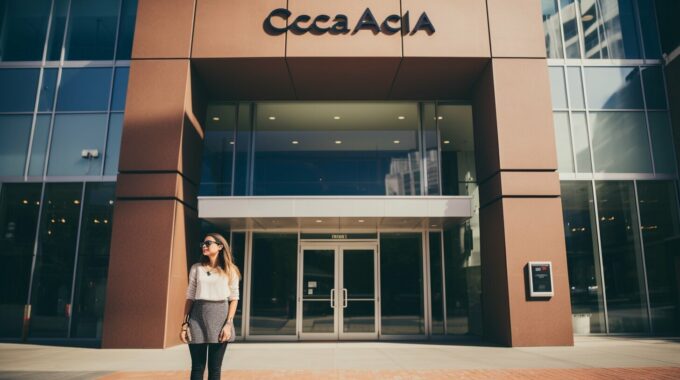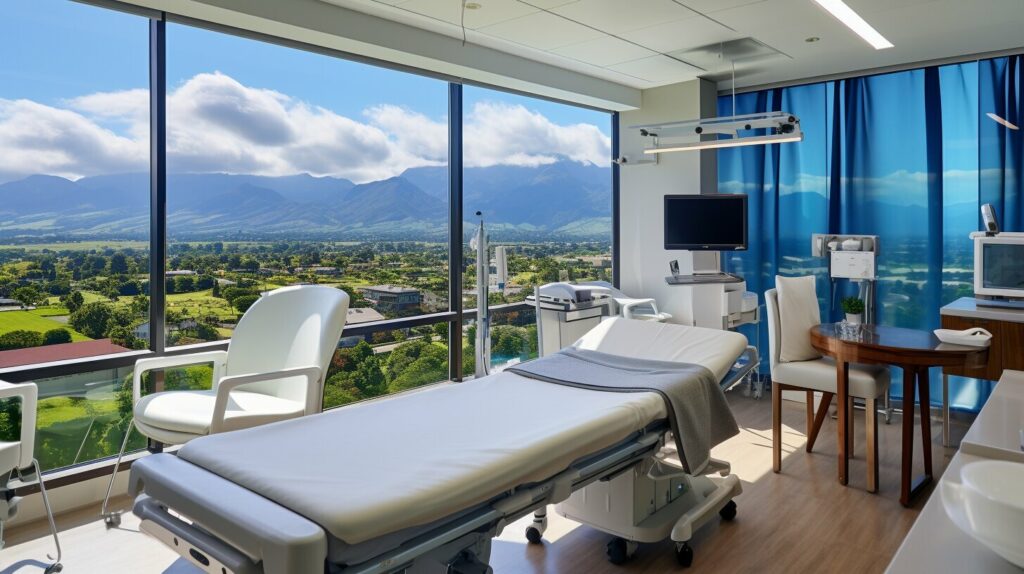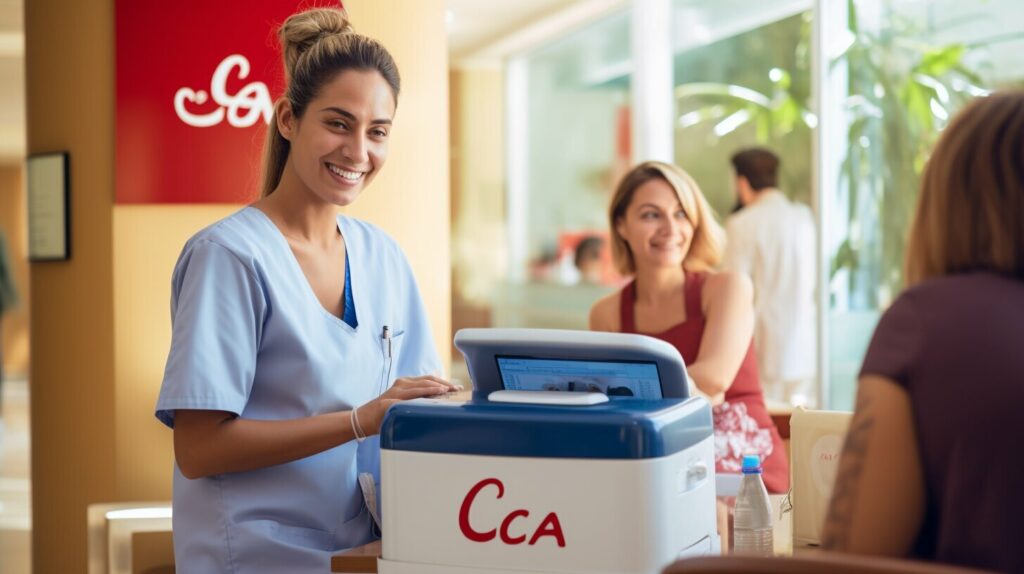At the forefront of property financing in Costa Rica, GapInvestments.com stands as a beacon for…

Understanding Costa Rica Social Security (Caja) System
The Costa Rica Social Security System, also known as the Caja Costarricense del Seguro Social or CAJA, is a government-run institution that provides healthcare services to all residents, including expats. Established in the 1940s, this system plays a vital role in ensuring that healthcare is accessible to everyone in Costa Rica, regardless of their financial situation.
Supported by mandatory monthly contributions from employees, employers, the self-employed, and retirees, the Caja Costa Rica system offers comprehensive coverage that includes preventive care, medical procedures, hospital visits, and prescription drugs. It aims to provide high-quality healthcare to all its beneficiaries.
- The Costa Rica Social Security System, also known as Caja, provides healthcare services to all residents, including expats.
- It is a government-run institution that ensures healthcare accessibility for everyone in Costa Rica.
- The system offers comprehensive coverage, including preventive care, medical procedures, hospital visits, and prescription drugs.
- Mandatory monthly contributions support the Caja system, which varies based on income level, employment status, and the number of dependents.
- Expats are required to sign up for Caja as part of their residency process and should stay informed about changes in Caja fees.
Caja Benefits and Services
The Caja Costa Rica system offers comprehensive coverage, including preventive care, medical procedures, hospital visits, prescription drugs, and retirement benefits. This government-run institution ensures that all residents, including expats, have access to essential healthcare services.
Under the Caja system, individuals can receive preventive care services such as vaccinations, screenings, and regular check-ups to maintain their overall health and well-being. In case of medical procedures, the Caja provides coverage for a wide range of treatments, from minor surgeries to major operations, ensuring that individuals receive the necessary medical care they need.
Hospital visits are also covered by Caja, ensuring that individuals can seek medical treatment and stay in a healthcare facility if required. In addition, the Caja system offers coverage for prescription drugs, ensuring that individuals have access to necessary medications at an affordable cost.
For retirees, the Caja Costa Rica system also provides retirement benefits. This ensures that individuals can have financial security and access to healthcare services after they have stopped working. These retirement benefits help retirees maintain their health and well-being during their golden years.
| Benefit | Description |
|---|---|
| Preventive Care | Vaccinations, screenings, regular check-ups |
| Medical Procedures | Minor surgeries, major operations |
| Hospital Visits | Inpatient care, emergency services |
| Prescription Drugs | Medications at an affordable cost |
| Retirement Benefits | Financial security and healthcare access for retirees |
With the Caja Costa Rica system, individuals can have peace of mind knowing that their healthcare needs are covered. Whether it’s preventive care, medical procedures, hospital visits, prescription drugs, or retirement benefits, the Caja ensures that everyone has access to essential healthcare services.
Conclusion
The Caja Costa Rica system is a cornerstone of the country’s healthcare system, providing comprehensive coverage and ensuring that everyone, including expats, can access essential healthcare services. From preventive care to medical procedures, hospital visits, prescription drugs, and retirement benefits, the Caja supports the health and well-being of all residents. It is an integral part of the social security system in Costa Rica and continues to evolve to meet the demands of the healthcare sector.

The Costa Rica Social Security System is supported by mandatory monthly contributions from employees, employers, the self-employed, and retirees, with fees varying based on income level, employment status, and the number of dependents. These contributions are essential in sustaining and expanding the healthcare services provided by the Caja Costarricense del Seguro Social.
Employees in Costa Rica contribute a percentage of their salary to the Social Security System, which is deducted directly from their paycheck. Employers also make contributions on behalf of their employees. The self-employed individuals are responsible for making their own contributions, while retirees contribute based on their pension income. The fees are determined by a progressive scale, ensuring that individuals with higher incomes contribute a higher percentage.
It is important to note that the Costa Rican Social Security System operates on a solidarity-based model, where those with higher incomes contribute more to support those with lower incomes. This system aims to provide equal access to healthcare services for all residents, regardless of their financial situation.
| Income Level | Percentage Contribution |
|---|---|
| Up to 10 basic salaries | Up to 9.34% |
| 10 to 12 basic salaries | 10.43% |
| 12 to 15 basic salaries | 11.12% |
| 15 to 20 basic salaries | 11.80% |
| Above 20 basic salaries | 12.25% |
These contributions play a crucial role in maintaining the quality and accessibility of healthcare services provided by the Costa Rican Social Security System. By contributing to the Caja, individuals and businesses contribute to the well-being of the entire population and ensure that everyone can access essential healthcare services.

Expats are required to sign up for Caja as part of their residency process by submitting the necessary documents and paying the calculated fee, ensuring access to Caja healthcare services and retirement benefits. The sign-up process for expats in Costa Rica is relatively straightforward, but it does require some preparation and understanding of the requirements.
To begin the process, expats will need to gather the following documents:
- A valid passport
- A valid residency ID card
- Proof of address in Costa Rica
- Proof of income or financial means
Once the necessary documents are gathered, expats can visit their local Caja office to start the sign-up process. At the office, they will need to fill out an application form and provide the required documentation. The staff will assess the individual’s residency status and calculate the monthly fee based on their income level and employment status.
It’s important for expats to keep in mind that Caja fees can vary and are subject to change. Staying informed about any updates or changes in the fee structure is crucial. It’s recommended to regularly check the official Caja website or consult with a knowledgeable professional to ensure accurate and up-to-date information. By staying informed, expats can manage their healthcare costs effectively and make informed decisions about their coverage under the Caja system.

| Category | Monthly Income | Monthly Fee |
|---|---|---|
| Employee | Less than US$1,000 | 8% of income |
| Employee | US$1,000 to US$2,000 | 10% of income |
| Employee | More than US$2,000 | 12% of income |
| Self-Employed | Based on income declared | Variable |
| Retiree | Pension amount | Variable |
Conclusion
The Costa Rica Social Security (Caja) System plays a crucial role in ensuring healthcare accessibility for all residents, including expats, and serves as a cornerstone of the country’s healthcare system. Established in the 1940s, the Caja Costarricense del Seguro Social or CAJA is a government-run institution that provides comprehensive coverage to residents, encompassing preventive care, medical procedures, hospital visits, and prescription drugs.
Mandatory monthly contributions from employees, employers, the self-employed, and retirees sustain the Caja system. The fees vary based on income level, employment status, and the number of dependents, ensuring that the burden is distributed fairly. Although there have been recent increases in Caja fees, the quality of healthcare services provided remains high.
For expats, signing up for Caja is a requirement during the residency process. Submitting the necessary documents and paying the calculated fee is necessary to access the system. It is essential for expats to stay informed about changes in Caja fees as they evolve to meet the demands of the healthcare system.
In conclusion, the Caja Costa Rica system plays a vital role in guaranteeing healthcare accessibility for all residents, regardless of their financial situation. By providing comprehensive coverage and requiring mandatory contributions, the Caja system ensures that everyone can access essential healthcare services and contributes to the overall well-being of the Costa Rican population.
FAQ
Q: What is the Costa Rica Social Security System?
A: The Costa Rica Social Security System, also known as Caja Costarricense del Seguro Social or CAJA, is a government-run institution that provides healthcare services to all residents, including expats.
Q: What does the Costa Rica Social Security System cover?
A: The Costa Rica Social Security System offers comprehensive coverage, including preventive care, medical procedures, hospital visits, and prescription drugs.
Q: Who is required to contribute to the Costa Rica Social Security System?
A: Mandatory monthly contributions to the Costa Rica Social Security System are required from employees, employers, the self-employed, and retirees.
Q: How are the Costa Rica Social Security fees calculated?
A: The fees for the Costa Rica Social Security System vary based on income level, employment status, and the number of dependents.
Q: How can expats sign up for the Costa Rica Social Security System?
A: Expats are required to sign up for the Costa Rica Social Security System as part of their residency process. They can do so by submitting the necessary documents and paying the calculated fee.
Q: Why is it important for expats to stay informed about changes in the Costa Rica Social Security fees?
A: It is important for expats to stay informed about changes in the Costa Rica Social Security fees as they continue to evolve to meet the demands of the healthcare system.


